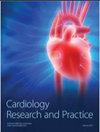Analysis of a Family with Brugada Syndrome and Sudden Cardiac Death Caused by a Novel Mutation of SCN5A
IF 1.8
4区 医学
Q3 CARDIAC & CARDIOVASCULAR SYSTEMS
引用次数: 3
Abstract
Background Brugada syndrome is a hereditary cardiac disease associated with mutations in ion channel genes. The clinical features include ventricular fibrillation, syncope, and sudden cardiac death. A family with Brugada syndrome with sudden cardiac death was analyzed to locate the associated mutation in the SCN5A gene. Methods and Results Three generations of a Han Chinese family with Brugada syndrome were recruited in the study; their clinical phenotype data were collected and DNA samples extracted from the peripheral blood. Next-generation sequencing was carried out in the proband, and candidate genes and mutations were screened using the full exon capture technique. The family members who participated in the survey were tested for possible mutations using Sanger sequencing. Six family members were diagnosed with Brugada syndrome, including four asymptomatic patients. A newly discovered heterozygous mutation in the proband was located in exon 25 of SCN5A (NM_000335.5) at c.4313dup(p.Trp1439ValfsTer32). Among the surviving family members, only those with a Brugada wave on their electrocardiogram carried the c.4313dup(p.Trp1439ValfsTer32) variant. Bioinformatics prediction revealed that the frameshift of the c.4313dup (p.Trp1439ValfsTer32) mutant led to a coding change of 32 amino acids, followed by a stop codon, resulting in a truncated protein product. Conclusion The newly discovered mutation site c.4313dup(p.Trp1439ValfsTer32) in exon 25 of SCN5A may be the molecular genetic basis of the family with Brugada syndrome.SCN5A基因突变致Brugada综合征和心源性猝死1家系分析
Brugada综合征是一种与离子通道基因突变相关的遗传性心脏病。临床特征包括心室颤动、晕厥和心源性猝死。我们分析了一例Brugada综合征合并心源性猝死的家族,以定位SCN5A基因的相关突变。方法与结果选取一个汉族Brugada综合征家族三代为研究对象;收集他们的临床表型数据并从外周血中提取DNA样本。先证者进行下一代测序,利用全外显子捕获技术筛选候选基因和突变。参与调查的家庭成员使用桑格测序检测可能的突变。6名家庭成员被诊断为Brugada综合征,包括4名无症状患者。新发现的先证者杂合突变位于SCN5A (NM_000335.5)的第25外显子c.4313dup(p.Trp1439ValfsTer32)。在幸存的家庭成员中,只有那些心电图上有Brugada波的人携带c.4313dup(p.Trp1439ValfsTer32)变体。生物信息学预测表明,c.4313dup (p.Trp1439ValfsTer32)突变体的移码导致32个氨基酸的编码改变,随后是一个终止密码子,导致蛋白产物的截断。结论新发现的SCN5A外显子25突变位点c.4313dup(p.Trp1439ValfsTer32)可能是Brugada综合征家族的分子遗传基础。
本文章由计算机程序翻译,如有差异,请以英文原文为准。
求助全文
约1分钟内获得全文
求助全文
来源期刊

Cardiology Research and Practice
Medicine-Cardiology and Cardiovascular Medicine
CiteScore
4.40
自引率
0.00%
发文量
64
审稿时长
13 weeks
期刊介绍:
Cardiology Research and Practice is a peer-reviewed, Open Access journal that publishes original research articles, review articles, and clinical studies that focus on the diagnosis and treatment of cardiovascular disease. The journal welcomes submissions related to systemic hypertension, arrhythmia, congestive heart failure, valvular heart disease, vascular disease, congenital heart disease, and cardiomyopathy.
 求助内容:
求助内容: 应助结果提醒方式:
应助结果提醒方式:


